| Listing 1 - 10 of 63 | << page >> |
Sort by
|
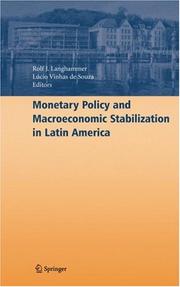
ISBN: 128096958X 9786610969586 3540282017 3540255834 364206499X Year: 2005 Publisher: Berlin ; New York : Springer,
Abstract | Keywords | Export | Availability | Bookmark
 Loading...
Loading...Choose an application
- Reference Manager
- EndNote
- RefWorks (Direct export to RefWorks)
Latin America is a very important region of the globe, which has been buffeted by successive waves of economic instability within the last decades. These waves have caused several episodes of hyperinflation or near hyperinflation, and several currency and financial crises, which, in certain moments, have even spilled over and affected other emerging markets. This has resulted in huge costs in terms of lost potential growth, and, as is inevitable, the markets most affected by this have been the least capable of defending themselves. In a region plagued by still considerable rates of social exclusion, with some of the highest rates of income concentration in the whole globe, the human costs of these crises have been very substantial. Starting in the early 1990s, the slow implementation of reforms, plus the resumption of more sustained growth—to a substantial degree linked to the increase in commodity prices, especially since the early 2000s—seems to have resulted in a more stable situation. Initially, in early reformers like Chile, later in the larger economies of the region, like Brazil and Mexico, a consensus— embraced by both sides of the political spectrum—towards integration in global markets, both in their trade and financial components, floating exchange rates, independent monetary authorities, and sustainable fiscal policies has emerged.
Monetary policy --- Economic stabilization --- Macroeconomics. --- International economics. --- Macroeconomics/Monetary Economics//Financial Economics. --- International Economics. --- Economic policy, Foreign --- Economic relations, Foreign --- Economics, International --- Foreign economic policy --- Foreign economic relations --- Interdependence of nations --- International economic policy --- International economics --- New international economic order --- Economic policy --- International relations --- Economic sanctions --- Economics
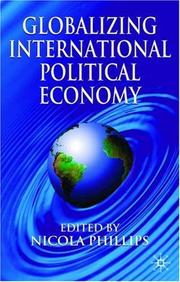
ISBN: 0333965043 0333965051 Year: 2005 Publisher: Houndmills Palgrave Macmillan
Abstract | Keywords | Export | Availability | Bookmark
 Loading...
Loading...Choose an application
- Reference Manager
- EndNote
- RefWorks (Direct export to RefWorks)
International economic relations --- Economics --- #SBIB:327.1H10 --- #SBIB:33H071 --- #SBIB:053.IOS --- Internationale betrekkingen: theorieën --- Economische internationale betrekkingen --- Globalization --- International economic relations. --- Economic aspects. --- Economic policy, Foreign --- Economic relations, Foreign --- Economics, International --- Foreign economic policy --- Foreign economic relations --- Interdependence of nations --- International economic policy --- International economics --- New international economic order --- Economic aspects --- Economic policy --- International relations --- Economic sanctions
Book
ISBN: 9264108114 Year: 2005 Publisher: Paris : OCDE,
Abstract | Keywords | Export | Availability | Bookmark
 Loading...
Loading...Choose an application
- Reference Manager
- EndNote
- RefWorks (Direct export to RefWorks)
Ce manuel donne des indications sur la façon de mesurer et d’interpréter les mesures de l’intensité et l’ampleur de la mondialisation. Il définit les concepts et propose des lignes directrices pour le recueil des données et la mise au point d’indicateurs de la mondialisation. Il traite en particulier des indicateurs se rapportant à l’investissement direct étranger, aux activités économiques des entreprises multinationales, à l’internationalisation de la technologie et à la mondialisation des échanges.
Economic history -- 21st century. --- Electronic books. -- local. --- International economic relations -- 21st century. --- Business & Economics --- Economic History --- International economic relations --- Economic history --- Economic policy, Foreign --- Economic relations, Foreign --- Economics, International --- Foreign economic policy --- Foreign economic relations --- Interdependence of nations --- International economic policy --- International economics --- New international economic order --- Economic policy --- International relations --- Economic sanctions --- OECD countries --- Economic conditions.
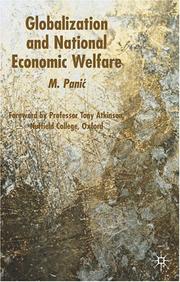
ISBN: 1403943435 Year: 2005 Publisher: Houndmills Palgrave Macmillan
Abstract | Keywords | Export | Availability | Bookmark
 Loading...
Loading...Choose an application
- Reference Manager
- EndNote
- RefWorks (Direct export to RefWorks)
National interest --- #SBIB:33H071 --- International economic relations --- Globalization --- National state --- State, The --- Self-determination, National --- Global cities --- Globalisation --- Internationalization --- International relations --- Anti-globalization movement --- Economic policy, Foreign --- Economic relations, Foreign --- Economics, International --- Foreign economic policy --- Foreign economic relations --- Interdependence of nations --- International economic policy --- International economics --- New international economic order --- Economic policy --- Economic sanctions --- Economische internationale betrekkingen
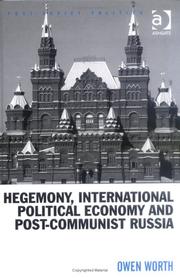
ISBN: 0754637573 Year: 2005 Publisher: Aldershot Ashgate
Abstract | Keywords | Export | Availability | Bookmark
 Loading...
Loading...Choose an application
- Reference Manager
- EndNote
- RefWorks (Direct export to RefWorks)
International economic relations. --- Post-communism --- Russia (Federation) --- Foreign economic relations. --- Politics and government --- International economic relations --- #SBIB:328H262 --- Economic policy, Foreign --- Economic relations, Foreign --- Economics, International --- Foreign economic policy --- Foreign economic relations --- Interdependence of nations --- International economic policy --- International economics --- New international economic order --- Economic policy --- International relations --- Economic sanctions --- Instellingen en beleid: Rusland en het GOS
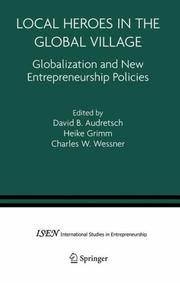
ISBN: 128060915X 9786610609154 0387234756 0387234632 1441936300 Year: 2005 Volume: 7 Publisher: New York, NY : Springer Science+Business Media,
Abstract | Keywords | Export | Availability | Bookmark
 Loading...
Loading...Choose an application
- Reference Manager
- EndNote
- RefWorks (Direct export to RefWorks)
Entrepreneurship and growth are central concerns of policy makers around the world. Local Heroes in the Global Village introduces public policies for the promotion of entrepreneurship on a comparative, primarily German-American level. The book contributes to the debate what role public policies play in stimulating national and regional economic growth. With a better understanding of the complexity and variety of existent entrepreneurship policies in the U.S. and Germany the reader of this volume will be able to formulate best practice, hands-on strategies which aim to promote nations as well as regions in an "entrepreneurial economy". This volume brings together conference contributions of leading academics and policy advisors from the United States and Europe. While the transatlantic conference on entrepreneurship policies was held in Germany, the program benefited from the presence of the American academics familiar with German policy issues and well known Congressional and National Academies staff familiar with policy making at the senior levels of the U.S. government. The volume has the virtue of both providing solid empirical analysis and theoretical underpinning from leading economists (among others, Rolf Sternberg, David B. Audretsch and Paul Reynolds), social scientists as well as a fresh perspective on the myths and realities concerning the operation of the U.S. innovation system. James Turner, for example, from The House Committee on Science (U.S. Congress) provides a legislative practitioner’s view of the decisions surrounding the seminal Bayh-Dole legislation and a much better perspective of commercial oriented behavior among American universities. These multiple perspectives bring together a unique and policy relevant view of U.S. and German entrepreneurship policies as well as both innovation systems both grounded in economics and policy.
Entrepreneurship --- Business enterprises --- Government policy. --- Business organizations --- Businesses --- Companies --- Enterprises --- Firms --- Organizations, Business --- Business --- Entrepreneur --- Intrapreneur --- Capitalism --- Business incubators --- Entrepreneurship. --- Economic policy. --- International economics. --- Economic Policy. --- International Economics. --- Economic policy, Foreign --- Economic relations, Foreign --- Economics, International --- Foreign economic policy --- Foreign economic relations --- Interdependence of nations --- International economic policy --- International economics --- New international economic order --- Economic policy --- International relations --- Economic sanctions --- Economic nationalism --- Economic planning --- National planning --- State planning --- Economics --- Planning --- National security --- Social policy --- Global village
Book
ISBN: 1280235004 9786610235001 3540273182 Year: 2005 Publisher: Berlin ; New York : Springer,
Abstract | Keywords | Export | Availability | Bookmark
 Loading...
Loading...Choose an application
- Reference Manager
- EndNote
- RefWorks (Direct export to RefWorks)
This book studies the international coordination of monetary and fiscal policies in the world economy. It carefully discusses the process of policy competition and the structure of policy cooperation. As to policy competition, the focus is on monetary and fiscal competition between Europe and America. Similarly, as to policy cooperation, the focus is on monetary and fiscal cooperation between Europe and America. The spillover effects of monetary policy are negative while the spillover effects of fiscal policy are positive. The policy targets are price stability and full employment. The policy makers follow either cold-turkey or gradualist strategies. Policy expectations are adaptive or rational. The world economy consists of two, three or more regions. The present book is part of a larger research project on European Monetary Union, see the references at the back of the book. Some parts of this project were presented at the World Congress of the International Economic Association in Lisbon. Other parts were presented at the International Institute of Public Finance, at the Macro Study Group of the German Economic Association, at the Annual Meeting of the Austrian Economic Association, at the Gottingen Workshop on International Economics, at the Halle Workshop on Monetary Economics, at the Research Seminar on Macroeconomics in Freiburg, and at the Passau Workshop on International Economics.
International economic relations. --- Monetary policy. --- Fiscal policy. --- Monetary unions. --- Europe --- United States --- Foreign economic relations --- Common currencies --- Currency areas --- Currency unions --- Optimum currency areas --- Currency question --- Money --- Tax policy --- Taxation --- Economic policy --- Finance, Public --- Monetary management --- Currency boards --- Money supply --- Economic policy, Foreign --- Economic relations, Foreign --- Economics, International --- Foreign economic policy --- Interdependence of nations --- International economic policy --- International economics --- New international economic order --- International relations --- Economic sanctions --- Government policy --- International economics. --- Macroeconomics. --- International Economics. --- Macroeconomics/Monetary Economics//Financial Economics. --- Economics
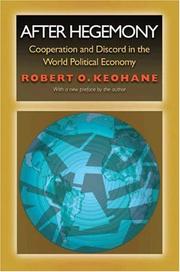
ISBN: 0691122482 9780691122489 Year: 2005 Publisher: Princeton Princeton university press
Abstract | Keywords | Export | Availability | Bookmark
 Loading...
Loading...Choose an application
- Reference Manager
- EndNote
- RefWorks (Direct export to RefWorks)
International economic relations. --- International cooperation. --- World politics --- Capitalism. --- Relations économiques internationales --- Coopération internationale --- Politique mondiale --- Capitalisme --- International economic relations --- 814 Theorie van de internationale betrekkingen --- 831 Internationale politieke economie --- Relations économiques internationales --- Coopération internationale --- Coexistence (World politics) --- Peaceful coexistence --- Economic policy, Foreign --- Economic relations, Foreign --- Economics, International --- Foreign economic policy --- Foreign economic relations --- Interdependence of nations --- International economic policy --- International economics --- New international economic order --- Economic policy --- International relations --- Economic sanctions
Book
ISBN: 926400839X Year: 2005 Publisher: Paris : OCDE-Organisation de cooperation et developpement economiques,
Abstract | Keywords | Export | Availability | Bookmark
 Loading...
Loading...Choose an application
- Reference Manager
- EndNote
- RefWorks (Direct export to RefWorks)
Economic development -- OECD countries. --- Electronic books. -- local. --- International economic relations. --- OECD countries -- Economic policy. --- Business & Economics --- Economic Theory --- Economic development --- OECD countries --- Economic policy. --- Economic policy, Foreign --- Economic relations, Foreign --- Economics, International --- Foreign economic policy --- Foreign economic relations --- Interdependence of nations --- International economic policy --- International economics --- New international economic order --- Development, Economic --- Economic growth --- Growth, Economic --- Economic policy --- International relations --- Economic sanctions --- Economics --- Statics and dynamics (Social sciences) --- Development economics --- Resource curse
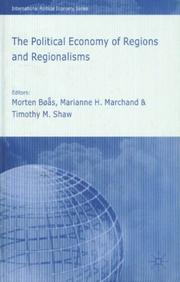
ISBN: 1403920907 9781403920904 Year: 2005 Publisher: Basingstoke Palgrave Macmillan
Abstract | Keywords | Export | Availability | Bookmark
 Loading...
Loading...Choose an application
- Reference Manager
- EndNote
- RefWorks (Direct export to RefWorks)
#SBIB:33H071 --- #SBIB:327.1H10 --- Economische internationale betrekkingen --- Internationale betrekkingen: theorieën --- Globalization. --- International economic relations. --- Interregionalism. --- Regionalism. --- Globalization --- International economic relations --- Interregionalism --- Regionalism --- Inter-regional relations --- Interregional relations --- Transregional relations --- Transregionalism --- Economic policy, Foreign --- Economic relations, Foreign --- Economics, International --- Foreign economic policy --- Foreign economic relations --- Interdependence of nations --- International economic policy --- International economics --- New international economic order --- Global cities --- Globalisation --- Internationalization --- Human geography --- Nationalism --- International relations --- Economic policy --- Economic sanctions --- Anti-globalization movement
| Listing 1 - 10 of 63 | << page >> |
Sort by
|

 Search
Search Feedback
Feedback About UniCat
About UniCat  Help
Help News
News